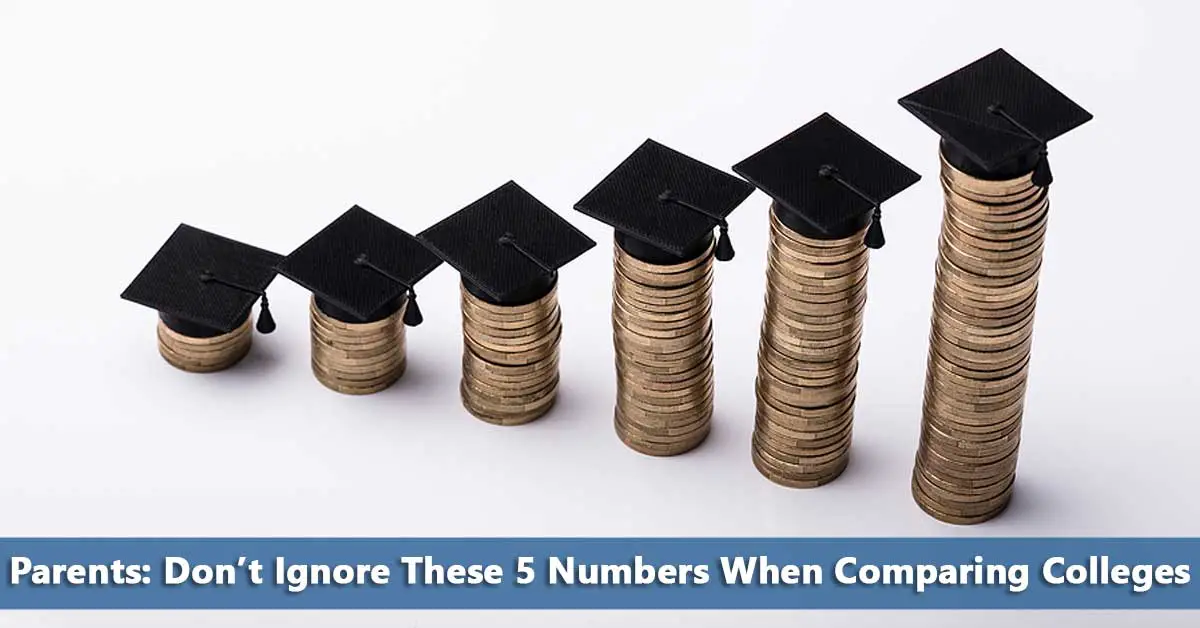 Before parents sit back and let their kids drive the college application process, there are some numbers they need to understand when comparing colleges. Because while it’s true that it’s the student who is going to attend college, the colleges are pretty clear that they are going to turn to the parents to pay the bill. And anyone expected to write a check to cover the cost of college, needs to have some meaningful numbers to evaluate the value of what their buying. However, not all numbers are created equal. For example, the acceleration speed of a car and its sticker price are both numbers, but one probably will have priority over the other for most people making a car purchase. Understanding these five numbers will provide you with some basic references for comparing colleges to decide if you’re willing to pay the college’s asking price.
Before parents sit back and let their kids drive the college application process, there are some numbers they need to understand when comparing colleges. Because while it’s true that it’s the student who is going to attend college, the colleges are pretty clear that they are going to turn to the parents to pay the bill. And anyone expected to write a check to cover the cost of college, needs to have some meaningful numbers to evaluate the value of what their buying. However, not all numbers are created equal. For example, the acceleration speed of a car and its sticker price are both numbers, but one probably will have priority over the other for most people making a car purchase. Understanding these five numbers will provide you with some basic references for comparing colleges to decide if you’re willing to pay the college’s asking price.
Read more
 Assume you are buying a car. All other factors are equal. Do you pick the one that costs $15,000 or $30,000? Seems like a no-brainer–go with the cheaper one.
Assume you are buying a car. All other factors are equal. Do you pick the one that costs $15,000 or $30,000? Seems like a no-brainer–go with the cheaper one.




 There are over 1,600 four-year public and private colleges in the United States. And guess what, they don’t all cost an arm and a leg to attend. With this many colleges, there have to be quality, affordable options available for families who look for them. And there are students attending college without facing the prospect of years of debilitating debt. Yet, attending affordable colleges comes with some trade-offs that not all families are willing to make.
There are over 1,600 four-year public and private colleges in the United States. And guess what, they don’t all cost an arm and a leg to attend. With this many colleges, there have to be quality, affordable options available for families who look for them. And there are students attending college without facing the prospect of years of debilitating debt. Yet, attending affordable colleges comes with some trade-offs that not all families are willing to make.
 If you want to pay less for college, you need to pay more attention to college statistics. I’m sure many parents and students hip deep in the college admissions process think that they are drowning in college statistics but are still facing the prospect of impossible tuition bills. The problem is that they aren’t paying attention to the right statistics, or at the very least, not considering them in terms of how they affect the cost of going to college.
If you want to pay less for college, you need to pay more attention to college statistics. I’m sure many parents and students hip deep in the college admissions process think that they are drowning in college statistics but are still facing the prospect of impossible tuition bills. The problem is that they aren’t paying attention to the right statistics, or at the very least, not considering them in terms of how they affect the cost of going to college.
 Over half of all college students attend schools less than
Over half of all college students attend schools less than 
 Before parents sit back and let their kids drive the college application process, there are some numbers they need to understand when comparing colleges. Because while it’s true that it’s the student who is going to attend college, the colleges are pretty clear that they are going to turn to the parents to pay the bill. And anyone expected to write a check to cover the cost of college, needs to have some meaningful numbers to evaluate the value of what their buying. However, not all numbers are created equal. For example, the acceleration speed of a car and its sticker price are both numbers, but one probably will have priority over the other for most people making a car purchase. Understanding these five numbers will provide you with some basic references for comparing colleges to decide if you’re willing to pay the college’s asking price.
Before parents sit back and let their kids drive the college application process, there are some numbers they need to understand when comparing colleges. Because while it’s true that it’s the student who is going to attend college, the colleges are pretty clear that they are going to turn to the parents to pay the bill. And anyone expected to write a check to cover the cost of college, needs to have some meaningful numbers to evaluate the value of what their buying. However, not all numbers are created equal. For example, the acceleration speed of a car and its sticker price are both numbers, but one probably will have priority over the other for most people making a car purchase. Understanding these five numbers will provide you with some basic references for comparing colleges to decide if you’re willing to pay the college’s asking price.
 If you have kids old enough for you to be thinking about the college admissions process and how you’ll pay for it, you also need to be thinking about how you’re going to compare colleges. Because the fact is that you’re going to be comparing lots of colleges, the sooner the better. You’re going to compare colleges when you decide which colleges to visit, which admissions reps to talk to at the college fair, which colleges to apply to, and which one to ultimately attend. So take this opportunity to consider the various ways you can actually compare colleges and their relative worth to your family’s situation.
If you have kids old enough for you to be thinking about the college admissions process and how you’ll pay for it, you also need to be thinking about how you’re going to compare colleges. Because the fact is that you’re going to be comparing lots of colleges, the sooner the better. You’re going to compare colleges when you decide which colleges to visit, which admissions reps to talk to at the college fair, which colleges to apply to, and which one to ultimately attend. So take this opportunity to consider the various ways you can actually compare colleges and their relative worth to your family’s situation.
 (Updated for 2022) I just finished updating the list of 50-50 colleges with the latest IPEDS data release and, as usual, thought I would share some statistically non-significant (as far as I know) observations. For those who don’t know what I mean by 50-50 colleges, these are colleges that accept at least 49% of students and have at least a 49% graduation rate. There are currently 600 such institutions with at least 500 or more full-time undergraduates up from the previous year’s 561.
(Updated for 2022) I just finished updating the list of 50-50 colleges with the latest IPEDS data release and, as usual, thought I would share some statistically non-significant (as far as I know) observations. For those who don’t know what I mean by 50-50 colleges, these are colleges that accept at least 49% of students and have at least a 49% graduation rate. There are currently 600 such institutions with at least 500 or more full-time undergraduates up from the previous year’s 561.
 Most students will not submit Early Decision college applications for the same reason that most students will be accepted at their first-choice school. Students generally apply Early Decision to improve the admission chances at a limited number of extremely competitive colleges. Only 10% of all four-year colleges accept less than 40% of students. Since most students aren’t going to these colleges, there is no reason to apply Early Decision. If you are considering applying Early Decision, you need to understand the following:
Most students will not submit Early Decision college applications for the same reason that most students will be accepted at their first-choice school. Students generally apply Early Decision to improve the admission chances at a limited number of extremely competitive colleges. Only 10% of all four-year colleges accept less than 40% of students. Since most students aren’t going to these colleges, there is no reason to apply Early Decision. If you are considering applying Early Decision, you need to understand the following: